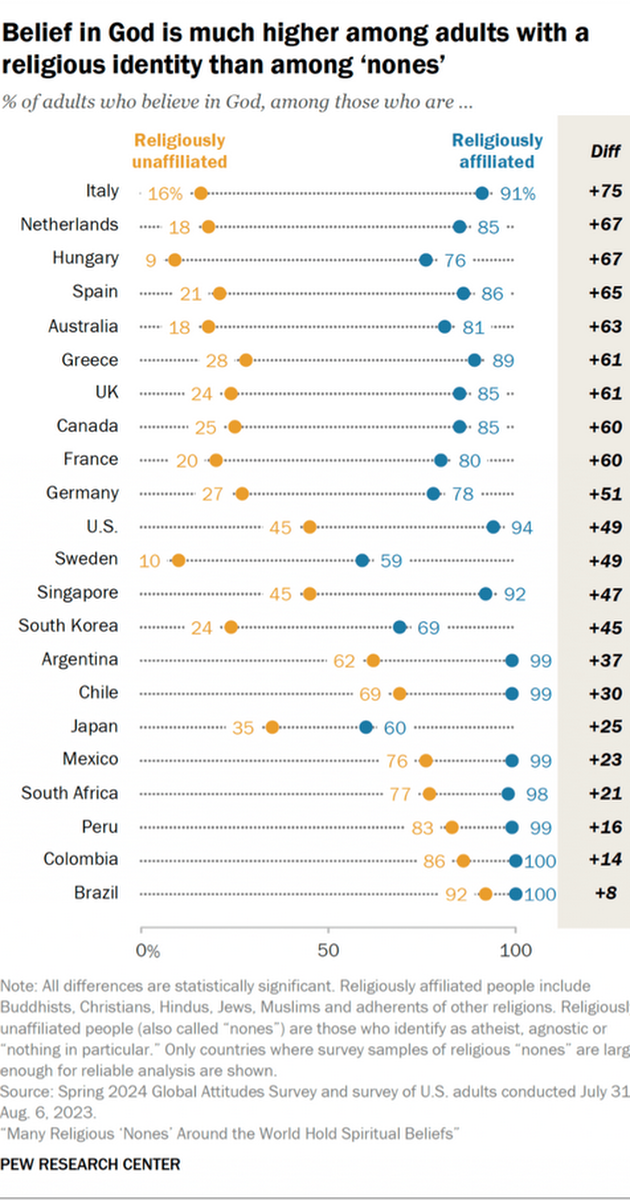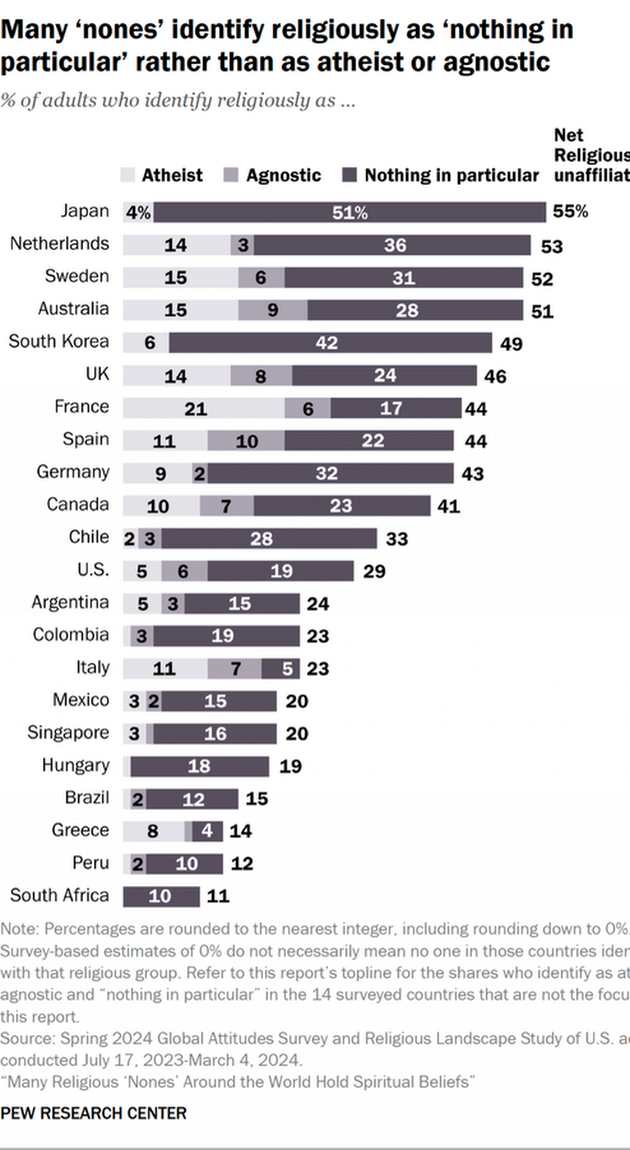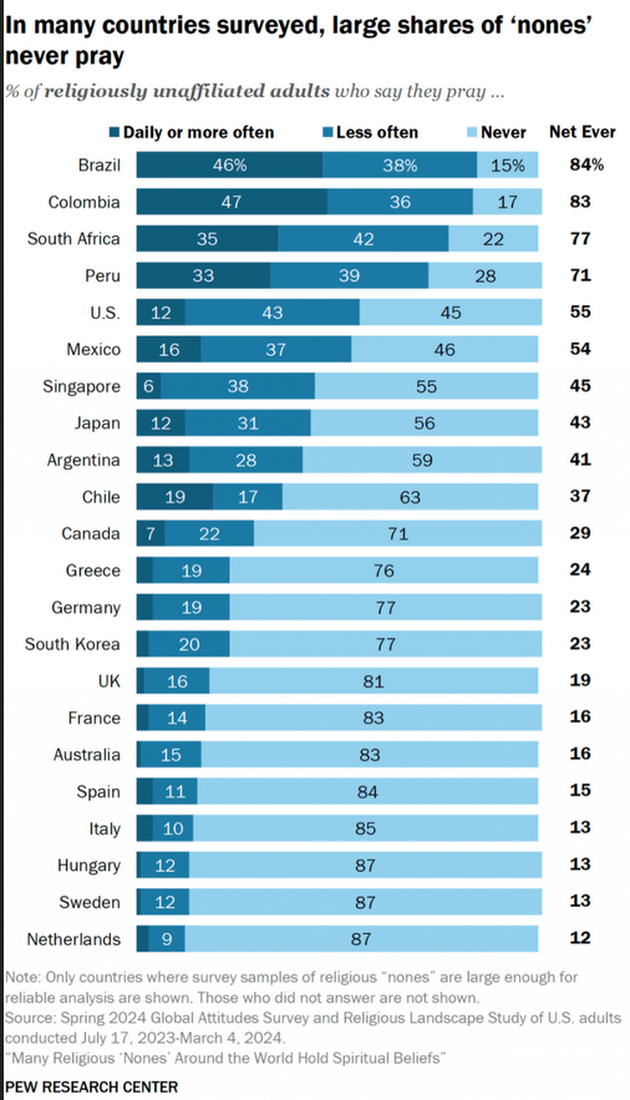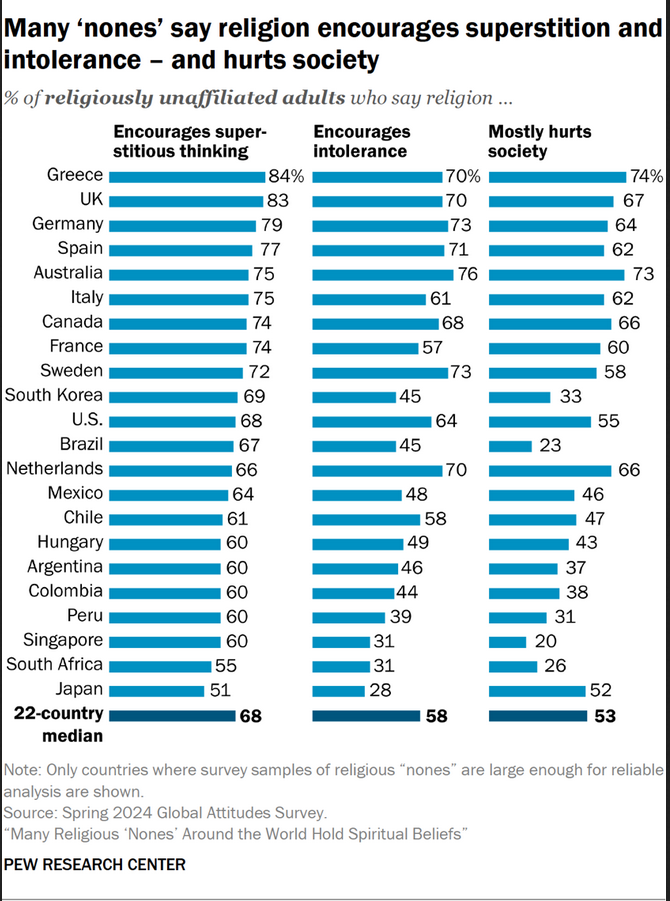A Pew Research Center survey shows that ‘nones’ in Europe “are much less inclined” to believe in God, and “tend to voice negative views of religion”.
![The majority of ‘nones’ surveyed said they never pray. / Photo: [link]Meredith Spencer[/link], Unsplash CC0.](https://cms.evangelicalfocus.com/upload/imagenes/68c0280d06e63_meredithspencer940.jpg) The majority of ‘nones’ surveyed said they never pray. / Photo: [link]Meredith Spencer[/link], Unsplash CC0.
The majority of ‘nones’ surveyed said they never pray. / Photo: [link]Meredith Spencer[/link], Unsplash CC0.
According to a new study from Pew Research Center, “the number of adults who are religiously unaffiliated – describing themselves as atheist, agnostic or ‘nothing in particular’, has climbed rapidly in the recent past” worldwide.
In general, the so called religious ‘nones’, “are less likely to hold spiritual beliefs and to engage in religious practices, and more likely to take a skeptical view of religion’s impact on society than are Christians, Muslims and people who identify with other religions”.
However, “sizable percentages of religiously unaffiliated adults, do hold some spiritual and religious beliefs”.
Pew Research surveyed people from 22 countries where “the survey’s samples of religiously unaffiliated adults are large enough to analyze and report separately”.
The survey shows that “many religiously unaffiliated adults also express belief in God”, above all, in Brazil (92%), Colombia (86%) and South Africa (77%)
Meanwhile, ‘nones’ in Europe “are much less inclined” to believe in God. Within the 9 European countries surveyed, Sweden (10%) and Hungary (9%) are the ones with less ‘nones’ who identify as believers.

[photo_footer] Pew Research Center. [/photo_footer]
Among the religiously unaffiliated, “atheists are less likely than the ‘nothing in particular’ group to believe in God. For example, in the United Kingdom, 8% of atheists express belief in God, compared with 32% of adults who identify with no particular religion”.
“It might seem surprising that many ‘nones’ express any religious or spiritual beliefs. Yet nonbelief isn’t always the main reason people have no religious affiliation”, explain the researchers, who mention “bad experiences with religious people” and “dislike of religious organisations”, as the main reasons.
The survey reveals that in nearly all of the 22 countries analyzed, the largest subgroup of ‘nones’ is people who say their religion is ‘nothing in particular’, rather than those who identify as atheist or agnostic.
Only in Greece and Italy is atheism the most common affiliation among ‘nones’.
Furthermore, agnostics are the smallest of the three groups that make up the ‘nones’ in 10 of the surveyed countries, including several European countries. In the Netherlands, for example, 36% of adults say they have no particular religion, 14% are atheist and just 3% are agnostic.

[photo_footer] Pew Research Center. [/photo_footer]
When asked about worship services attendance, the majority of ‘nones’ said they never attend religious services.
In Germany, 30% said they attend religious services occasionally, but only 2% say they attend monthly or more often.
Similarly, in most of the countries studied, a majority of ‘nones’ said they never pray, and the countries where they are least likely to pray are in Europe. In Hungary, the Netherlands and Sweden, for example, 87% of ‘nones’ say they never pray.

[photo_footer] Pew Research Center. [/photo_footer]
“Many ‘nones’ express negative views about religion’s influence on society”, points out the survey.
In about half of the countries, a majority of them said religion encourages intolerance. This includes 73% each in Germany and Sweden.
“‘Nones’ in Europe tend to voice negative views of religion. For example, most religiously unaffiliated adults in Spain said that religion encourages superstitious thinking (77%) and intolerance (71%), and that it mostly hurts society (62%)”, states Pew.

[photo_footer] Pew Research Center. [/photo_footer]
In Greece, 74% of ‘nones’ reponded that religion mostly hurts society, the higest percentaje of all the European countries surveyed.
[analysis]
[title]Join us to make EF sustainable[/title]
[photo][/photo]
[text]At Evangelical Focus, we have a sustainability challenge ahead. We invite you to join those across Europe and beyond who are committed with our mission. Together, we will ensure the continuity of Evangelical Focus and our Spanish partner Protestante Digital in 2025.
Learn all about our #TogetherInThisMission initiative here (English).
[/text][/analysis]

Las opiniones vertidas por nuestros colaboradores se realizan a nivel personal, pudiendo coincidir o no con la postura de la dirección de Protestante Digital.
Si quieres comentar o